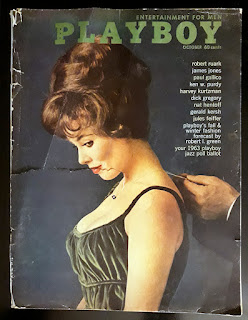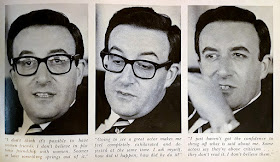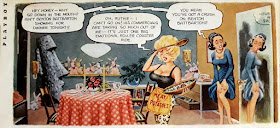Highlights: For me, the standout of this issue is the interview of troubled, troublesome, brilliant and insecure Peter Sellers. Dr. Strangelove and The Pink Panther were still two years in the future. He'd completed 16 films in the previous five years and had garnered considerable attention for his role of Clare Quilty in Stanley Kubrick's Lolita. Enjoying hindsight afforded by the intervening six decades, I found this exchange particularly striking:
Sellers: I'm not a star, because I have no personality of my own. Playboy: Hasn't success enabled you to find your personality? Sellers: Success hasn'e enabled me to find out anything about myself. I just know I can do certian things. If you go too deep into yourself, if you analyze yourself too closely, it's no good for the job. You can either act or you can't. If you analyze your own emotions all the time, and every doorknob you handle, you know, you're up the spout. Playboy: But supposing you were asked to play a character called Peter Sellers, how would you play him? Sellers: What I would do, I'd go to see all my friends. I go to see my acquaintances, and ask them how they see me, ask for their impressions of Peter Sellers. And then I would sift these characterization. That's all I can do, because I am quite unaware of what I am.Oddly, the interviewer is not credited. Was this standard practice for Playboy back in the day? Curious.
Other thoughts: The cover on this one had torn off but I initially thought it was an incorrect match. What I considered the biggest selling points of the issue--Peter Sellers, Arthur C. Clark, Shel Silverstein--weren't mentioned on the cover, but folks like Nat Hentoff, Ken W. Purdy and Gerald Kersh (who I've never heard of) were. Shows how much times, and perspectives, change.
There's a an excerpt from Percival by Chertien de Troyes, "Gawain and the Lady of the Pavilion," presented as a ribald classic, so we know our 1962 readers were well-read when it came to their Arthurian lore. And there's the 1963 Playboy Jazz Poll, which indicates the importance jazz still played in entertainment despite the ascendance of rock and roll. Sadly, the poll itself is torn out, which I suppose means the original owner was passionate enough about music to make his (or her) opinions known to the editors.Finally, the tikiphile in me squeed! when I saw this panel of the long-running Playboy comic, "Little Annie Fanny." She. Has. A. Moai. Life goals.
Now Playing: The Rolling Stones RewindChicken Ranch Central




Playboy did not identify interviewers by name until years later. Kenneth Tynan conducted the Peter Sellers interview, but did not receive written credit until his interview with Richard Burton.
ReplyDelete